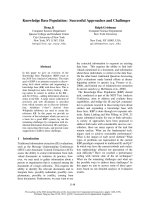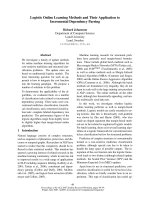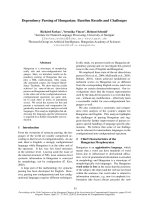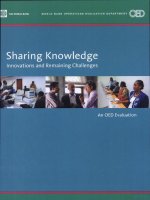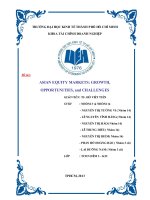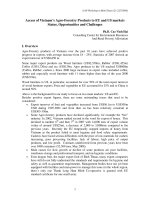Editorial: Web-based learning: Innovations and challenges
Bạn đang xem bản rút gọn của tài liệu. Xem và tải ngay bản đầy đủ của tài liệu tại đây (79.13 KB, 3 trang )
Knowledge Management & E-Learning: An International Journal, Vol.2, No.4.
337
Editorial: Web-Based Learning: Innovations and
Challenges
Mudasser F. Wyne*
Technology &Health Sciences Center, School of Engineering and
Technology, National University, USA
E-mail:
*Corresponding author
Abstract: This special issue of the Knowledge Management & E-Learning: an
international journal(KM&EL) aims to stimulate interest in the web based
issues in both teaching and learning, expose natural collaboration among the
authors and readers, inform the larger research community of the interest and
importance of this area and create a forum for evaluating innovations and
challenges. We intend to bring together researchers and practitioners interested
in developing and enhancing web-based learning environment. The objectives
for this attempt are to provide a forum for discussion of ideas and techniques
developed and used in web based learning. In addition the issue can also be
used for educators and developers to discuss requirements for web-based
education. Both theoretical papers and papers reporting implementation models,
technology used and practical results are included in the issue.
Keywords: Web-Based Learning, Innovations, Challenges.
Biographical notes: Mudasser F. Wyne Currently serving as a Professor of
Computer Science at School of Engineering and Technology, National
University, San Diego, USA. He is a co-lead faculty for BSc in Information
Systems programs. Dr. Wyne has a Ph.D. in Computer Science, M.Sc. in
Engineering and B.Sc., in Electrical Engineering. He has been in academics for
20+ years and supervised over 50 graduate and undergraduate projects. Dr.
Wyne is with the Accreditation Board of Engineering and Technology (ABET),
USA for more than 8 years and is currently serving as commissioner for
Computing Accreditation Commission. In addition, he is a guest editor for a
journal, associate editor and serving on editorial boards for four international
journals. He has also served as Chair and Co-Chair of numerous conferences,
workshops, tracks and panels, in addition to serving on the program committee
for around 50 international conferences. Dr. Wyne has given invited talks on
numerous occasions and published number of articles in peer reviewed
international journals and peer reviewed international conferences.
1. Introduction
This special issue of the Knowledge Management & E-Learning: an international
journal(KM&EL) aims to stimulate interest in the web based issues in both teaching and
learning, expose natural collaboration among the authors and readers, inform the larger
research community of the interest and importance of this area and create a forum for
evaluating innovations and challenges. We intend to bring together researchers and
practitioners interested in developing and enhancing web-based learning environment.
338
Wyne, M.F.
The objectives for this attempt are to provide a forum for discussion of ideas and
techniques developed and used in web based learning. In addition the issue can also be
used for educators and developers to discuss requirements for web-based education. Both
theoretical papers and papers reporting implementation models, technology used and
practical results are included in the issue.
The call for contributions resulted in a large number of submitted research papers
on a variety of topics, including Information quality, role of administrators, chat
discussions, learning style and navigation behavior and digital application of web
engineering. Mona Alkhattabi et al (2010) in their paper on “Information quality
framework for e-learning systems” talk about a new information quality framework that
provides a comprehensive indication of the quality of information. The framework
measure the quality based on information quality attributes grouped in intrinsic,
contextual representation and accessibility dimensions. The paper submitted by Yang
(2010) talks about the challenges and new roles played by the administrators in
maintaining the quality of online education. Another paper is by Chima Adiele et al
(2010). Their paper talks about advances in information and communication technologies
and present an interactivity model to measure level of interactivity of students in a class.
The paper by Stanley Loh et al (2010) presents a system that analyzes the themes
discussed in a chat room and then recommends information sources according to the
context of discussion. Theme of discussion is identified by using text mining and
recommendations are based on user profile. Nabila Bousbia et al (2010) in their paper
present their research on establishing a relationship between the learner’s navigation
behavior and their learning style from the analysis of browsing behavior. In the next
paper Ezendu Ariwa and Morris Michael (2010) discuss a challenge faced by the
business community to promote and establish their business. Xun Ge et al (2010) in their
paper present a qualitative study of the experiences of faculty members in transitioning
from one learning management system to another system. In the last paper, Olaniran et al
(2010) examine cross cultural challenges in implementing Web-based instruction,
through a discussion of cultural dimensions, cultural technology perceptions, language
barriers, and user needs.
Acknowledgements
The call for paper for this issue generated lot of interest in the research community so the
guest editor wish to express his gratitude to all authors who submitted their papers for
their effort and support for this special issue. I would also like to thank the reviewers, for
their time and support, who submitted reviews and suggestions to authors for improving
the quality of the papers, especially those accepted for this issue. I am also indebted to
Editors-in-Chief Dr. Maggie M. Wang and Dr. Stephen J.H. Yang for the opportunity to
finally make this special issue a reality, it would have not been possible without their help
and support.
References
1
Adiele, C., & Nwanze, E. D. (2010). The Dynamics of Interactivity Modeling for eLearning. Knowledge Management & E-Learning: An International Journal, 2(4),
370-384.
Knowledge Management & E-Learning: An International Journal, Vol.2, No.4.
2
3
4
5
6
7
8
9
10
11
12
13
14
15
16
339
Alkhattabi, M., Neagu, D., & Cullen, A. (2010). Information Quality Framework for
e-Learning Systems. Knowledge Management & E-Learning: An International
Journal, 2(4), 340-362.
Anonymous (2009). What is e-learning. Retrieved November 30, 2009, from
/>Ariwa, E., & Michael, M. (2010). Facilities Management and Digital Application of
Web Engineering: Implications for Business Informatics Systems. Knowledge
Management & E-Learning: An International Journal, 2(4), 422-432.
Bousbia, N., Rebai, I., Labat, J. M., & Balla, A. (2010). Analysing the Relationship
between Learning Styles and Navigation Behaviour in Web-Based Educational
System. Knowledge Management & E-Learning: An International Journal, 2(4),
400-421.
Downes, S. (2005, October 17). E-learning 2.0. National Research Council of
Canada.
Retrieved
November
30,
2009,
from
/>Ge, X., Lubin, I., & Ke Zhang, K. (2010). An Investigation of Faculty's Perceptions
and Experiences when Transitioning to a New Learning Management System.
Knowledge Management & E-Learning: An International Journal, 2(4), 433-447.
Ivanescu, A., Barda, I, & Vladicescu, F. P. (2008). Distance learning answering
students’ needs: The example of the interactive e-learning environment (IELE). The
Proceedings of the Fourth International Scientific Conference on E-learning and
Software for Education, Bucharest.
Kilgore, D.W. (2001). Critical and postmodern perspectives on adult learning. New
Directions for Adult and Continuing Education, 2001(89), 53-62.
Logan, R.K. (2000). The sixth language: Learning a living in the Internet age.
Physics.utoronto.ca. Retrieved November 30, 2009, from .
Logan, R.K. (1997). The fifth language: Learning and living in the computer age.
Toronto: Stoddard Pub.
Loh, S., Lichtnow, D., Kampff, A. J. C., & de Oliveira, J. P. M. (2010).
Recommendation of Complementary Material during Chat Discussions. Knowledge
Management & E-Learning: An International Journal, 2(4), 385-399.
Mushtaha, A., &, Troyer, O. D. (2007). Cross-cultural understanding of content and
interface in the context of e-learning systems. Lecture Notes in Computer Science
(Volume 4559), 164-173. Springer Berlin / Heidelberg.
Olaniran, B. A., Williams, I. M. , & Rodriguez, N. (2010). Cross-Cultural Challenges
in Web-Based Instruction. Knowledge Management & E-Learning: An International
Journal, 2(4), 448-465.
Srimathi, H., & Srivatsa, S. K. (2008). Knowledge representation in personalized
elearning. Academic Open Internet Journal, 23. Retrieved November 30, 2009,
from />Yang, Y. (2010). Roles of Administrators in Ensuring the Quality of Online
Programs. Knowledge Management & E-Learning: An International Journal, 2(4),
363-369.

